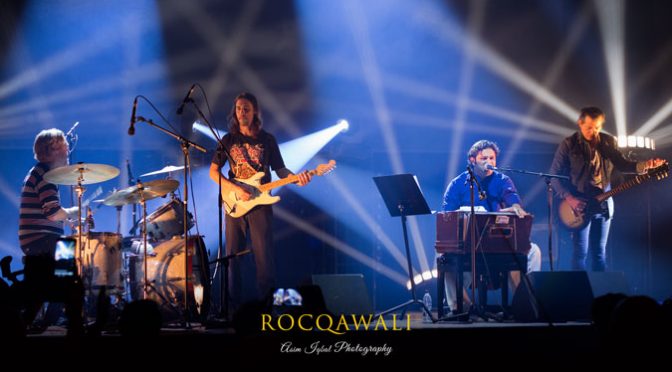Danish-Pakistani rock band Rocqawali has a new album titled Kakam, released in late January 2020.
The band’s sound is deeply rooted in the 800 year-old Sufi tradition of qawwali music. Drawing from those roots, Rocqawali has developed a 21st century version by adding western electric guitars and drums.

Kalam is Rocqawali’s third album. The title means expression or word in Urdu and is often used as a word to describe Sufi poetry. Band member Tin Soheili composed the score to Rubaiyat Hossain’s feature film Made in Bangladesh. The track Mandi Han ya Changi Han was written and performed by Rocqawali.
All of Rocqawali’s albums have been recorded in one take and their second album Sufi Spirit was recorded by Mark Howard, known for his work with Bob Dylan, Neil Young or U2. You can listen to Sufi Spirit here.
Multi award-winning Danish director Torben S. Jensen shot Rocqawali’s new music video ‘Pya Da Nagma’.
Rocqawali has been touring in Asia during the past couple of months and will soon be on the road again for a European tour.
Angel Romero – How and when did Rocqawali come together as a band?
Rocqawali – Guitarist Jonas Stampe – who is of half Danish half Pakistani descent – went to Pakistan in 2004 to stay and learn with the legendary qawwals Meher & Sher Ali. During this period he performed more and more with the group and joined them on their long and enduring tours all over the country. Around the same time Ejaz Sher Ali (who is the band leader’s son) had started singing in the group (which is a family business) and during those many tours Jonas and Ejaz developed a brother-like bond. As part of their friendship, Jonas also wanted to invite Ejaz to come to Denmark, to play music and discover his own musical background.
They met with drummer Stephan Grabowski during one of those trips to Denmark, who had always dreamed of being part of a band combining both Sufi and Western music. During one of their first meetings as a band, Iranian guitarist Tin Soheili was present because of his Sufi background. The band emerged in the most natural way.



AR – Where is Rocqawali currently based?
R – In Denmark and Pakistan.
The group is described as a Danish-Pakistani rock band. What do you think are the essential elements of your music?
R – Our long friendship (7 to 8 years now)! From now on it’s just about bringing each of our personal musical expressions into the group and try to be creative in spite of the obvious physical distance between us. It can of course be problematic, but when things do work out it is emotionally strong and unforgettable.

AR – How did your musical ideas evolve throughout the years?
R – To be honest, we started playing a bit out of our own boxes, which slowly helped us to understand each other’s background. On the one hand it can be very hard for singer Ejaz to understand the emotional content of loud guitars, but on the other hand, there is a huge amount of culture in the Pakistani melodies, which is an on-going process for the Danish guys to really feel it.
AR – Tell us about your new album, Kalam.
R – It was recorded in Denmark – we produced it ourselves. Whenever we have the chance we try to record and make new music. Suddenly we had enough material for a whole album.

AR – Who plays on Kalam?
R – The group, Ejaz, Jonas, Stephan, Tin – and our good friend Martin Dahl, bass player, who has toured with us many times.

AR – Pakistani music became famous in the West thanks to Nusrat Fateh Ali Khan and other Qawwalli artists. How is the Qawwali and roots music scene in Pakistan now?
R – It is doing good. The Sufi culture is still strong and attractive for many young people, it allows them a way-out. They’re not receptive to any American influence and also need their own spirituality. I can honestly say that no other place in the world is the Sufi scene as relevant and up-to-date as in Pakistan – where millions of people get together to listen to it.
AR – In what ways are you promoting your music?
R – We were lucky to get a bit of money from a cultural fund. We used it to pay some people to get the new album some press, so people know it exists. I guess that is all we did. It is wiser to let others do the promotion, so that we can continue our own work.
AR – If you could gather any additional musicians, or bands, to collaborate with, whom would that be?
R – Penderecki, Aphex Twin, Zakir Hussein – those would be exciting.
We jam all we can and collaborate with many artists around the world – but it is not actually the main object here, we hope to crystallize as a band as much as possible.
AR – Aside from the release of Kalam, do you have any additional upcoming projects to share with us?
R – We are planning a tour in Pakistan for summer 2020. Somebody in Australia has also just called us – that would be the first time and very cool. We want to come and play live in as many places as possible – we are mostly a live band – and there are so many Pakistani/Indian communities around the world that we would love to reach.
headline photo: Asim Iqbal Photography
Discography:
The Sufi Rock’n’Roll (2013)
Sufi Spirit (Riverboat Records, 2017)
Kalam (2020)
Official website: ww.rocqawali.com


